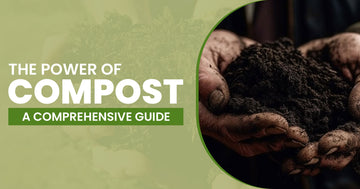
Are you striving for a sustainable way of living? Verifying labels to ensure that the item you're about to purchase is recyclable? You're doing an amazing job! And when the product is designated as biodegradable, you're under the impression that it's meant to be beneficial for the environment, correct?
In an era where environmental concerns are paramount, the term "biodegradable" has gained significant attention. From packaging materials to personal care products, you've likely come across this term on various items. But what exactly does "biodegradable" mean, and why is it important? In this article, we'll dive into the concept of biodegradability and its significance in the context of sustainability.
What is Biodegradable?

At its core, "biodegradable" refers to the ability of a material or substance to break down naturally into smaller, harmless components over time with the help of microorganisms like bacteria, fungi, and other living organisms. These microorganisms consume the biodegradable substance as a food source, leading to its eventual decomposition. This process is part of nature's recycling system, where organic matter is cycled back into the environment as nutrients for new life.
Key Characteristics of Biodegradable Materials
- Natural Breakdown: Biodegradable materials decompose through natural processes, such as exposure to air, moisture, and microorganisms. This is in contrast to non-biodegradable materials, like plastics, which persist in the environment for hundreds of years without breaking down.
- Environmental Friendliness: Biodegradable materials have a lower impact on the environment compared to non-biodegradable ones. As they break down, they don't accumulate in landfills or pollute water bodies, reducing the overall burden on ecosystems.
- Diverse Applications: Biodegradability is relevant in various industries. From packaging to agriculture, textiles to personal care products, the use of biodegradable materials can help minimize waste and promote sustainability.
- Soil Enrichment: When biodegradable materials decompose, they contribute valuable nutrients to the soil, enhancing its fertility and promoting plant growth.
Importance of Biodegradability

The importance of biodegradability cannot be overstated in the context of our planet's health and longevity. Here's why it matters:
- Reduced Waste: Non-biodegradable materials, especially plastics, have become a major environmental concern due to their persistence and the difficulty of disposing of them. Biodegradable alternatives offer a solution by breaking down naturally and reducing the amount of waste that accumulates in landfills and oceans.
- Ecosystem Protection: Improper disposal of non-biodegradable materials can harm wildlife, pollute water bodies, and disrupt ecosystems. Biodegradable materials, on the other hand, pose fewer risks to the environment, as they eventually return to nature without causing long-term harm.
- Resource Conservation: Biodegradable materials are often derived from renewable resources, which helps conserve fossil fuels and reduces the need for extracting raw materials.
- Sustainable Practices: Embracing biodegradable options aligns with sustainable practices, supporting a circular economy where materials are reused, recycled, or naturally returned to the environment.
Challenges and Considerations
While biodegradability holds promise, it's important to approach it with a critical eye. Some materials labeled as "biodegradable" may only break down under specific conditions that might not be present in all environments. Additionally, the speed and effectiveness of biodegradation can vary widely.
Now we have learned about what biodegradable is, its characteristics and benefits, let us learn how to identify biodegradable products and make an informed decision.
What are Biodegradable Products?

A biodegradable product decomposes over time, causing minimal harm to the environment. These products can reduce waste accumulation and contribute to a more sustainable future.
Examples of biodegradable products include:
- Bioplastics made from plant-based materials like cornstarch or sugarcane,
- Packaging materials such as cardboard and certain plant-based plastics,
- Cleaning products designed to degrade harmlessly after use,
- Cutlery and tableware crafted from bamboo or sugarcane,
- Clothing composed of natural fibers like cotton and wool,
- Beauty products formulated to break down naturally,
- Food containers made from paper or bagasse,
- Bags are woven from plant fibers like cotton or jute,
- Garden products such as biodegradable seedling pots and mulch films,
- Even diapers made from biodegradable materials decompose more rapidly in landfills compared to traditional options.
Pro tip: To make informed choices, look for certifications from reputable organizations that validate a product's biodegradability claims. For instance, the "OK Biodegradable" certification from TÜV Austria ensures that a product will disintegrate completely in a composting environment.
Biodegradation time: How long does it take?
The time it takes for items to biodegrade varies based on factors like the composition of the material, environmental conditions, and the presence of microorganisms.
- Organic food waste, such as fruits and vegetables, can typically break down within a few weeks to months, especially in composting conditions.
- Paper decomposes in weeks to months, while natural wood products take several months to years to degrade. Natural fibers like cotton biodegrade in a few months to a year, while wool fibers can take longer due to their complexity.
- Biodegradable plastics like PLA can break down in around 6 months to a few years in industrial composting facilities. In contrast, conventional plastics like PET and HDPE can persist for hundreds of years in natural environments.
- Synthetic materials such as polyester fabrics may decompose for decades or even centuries.
What are the Optimal Conditions for Biodegradation?
Biodegradation is best achieved in conditions that minimize environmental damage while allowing materials' breakdown. Several factors contribute to these ideal conditions:
|
Adequate moisture is essential for biodegradation. |
|
Moderate temperatures within the range of 50°F to 140°F (10°C to 60°C) accelerate the rate of biodegradation |
|
Most biodegradation processes require oxygen. |
|
Bacteria, fungi, and other microorganisms play a vital role in biodegradation |
|
The pH level of the environment affects microbial activity. A neutral to slightly alkaline pH is generally good for biodegradation. |
|
Microorganisms need nutrients like carbon, nitrogen, and phosphorus to thrive. Organic materials rich in these nutrients provide and fasten the biodegradation process |
Thinking of Switching to Biodegradable Products?
Switching to biodegradable products is a great idea because they are better for the environment. These products can break down naturally over time, so they don't stay as waste for long. This helps to reduce pollution and keep our planet cleaner and healthier. So, using biodegradable products is a simple way to take care of our Earth!
How BgreenToday Helps in Maintaining Sustainability?
At BegreenToday we sell biodegradable products that help people live more sustainably. By shopping at our store, you can make a difference for the planet and for yourself. Our range of biodegradable products goes beyond traditional shopping – it's about making conscious choices that benefit both you and the Earth.
FAQs
1.What does it mean if something is biodegradable?
Biodegradable means a substance can naturally break down into harmless elements over time through microorganisms, contributing to eco-friendly waste disposal and reducing environmental impact. Remember to responsibly dispose of biodegradable items to optimize their decomposition process.
2. Does biodegradable mean eco-friendly?
Yes, biodegradable materials are generally considered eco-friendly because they break down naturally over time, reducing waste accumulation and minimizing harm to the environment.
3. What does 100% biodegradable mean?
“100% biodegradable" indicates that a material or product is entirely capable of breaking down into natural components through the actions of microorganisms, leaving no harmful residues behind. It implies that the entire substance will eventually return to the environment in a way that does not harm ecosystems or contribute to long-lasting pollution.
4. What are 3 examples of biodegradable?
Biodegradable examples include food waste like fruit peels, packaging materials such as cornstarch-based plastics, and cleaning products like eco-friendly soaps that break down harmlessly over time, reducing environmental impact.




